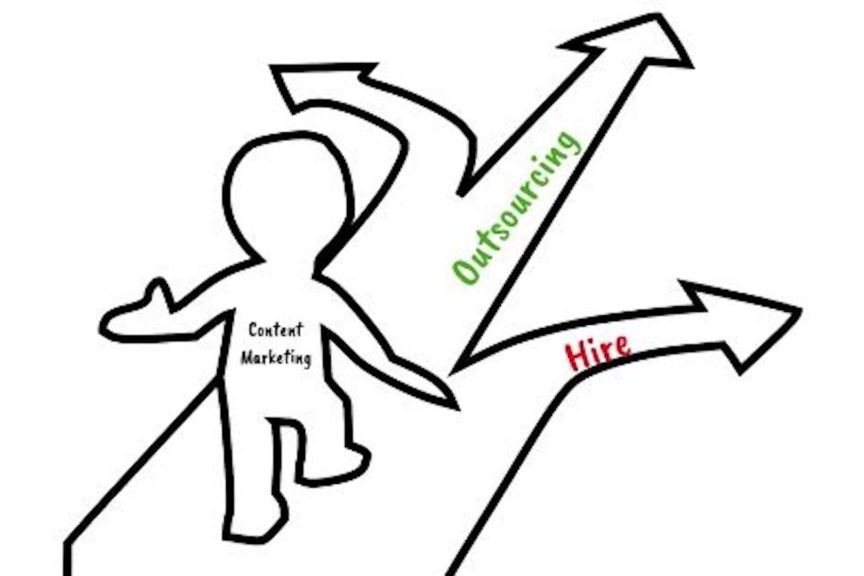How To Manage Freelance Writers Without Going Mad
Every time I think about my writing career of more than two decades, I realize how old I’m getting.
Though I can do without the gray hairs and need for more and more physical and mental exercises to stay fit, I can’t do without the knowledge I’ve obtained throughout my writing life.
I took many chances and failed often. I gained the most extensive education through those failures, though, and many failures arrived during my time as a freelancer and as a freelance manager.

I’ve managed remote freelancers for publications and for agencies, including ContentMender, which has a business model built around a strong network of smart and driven freelance writers.
The following are 15 tips for smaller businesses and digital marketing agencies that are looking to optimize the use of freelance writers.
Many of these lessons will carry over to other freelance work, such as web design and business development. But my business and passions are focused on the written word, and that’s what I feel I know best.
1. Brief Them About the “Why” of Your Brand
Before the first piece of writing is assigned, make sure you brief your prospective freelancer about the “why” of your brand, regardless if you’re a small business, corporation, or digital marketing agency that works with clients.
The quickest way to complete this task is through your mission statement. Creating a mission statement should be the initial focus of most businesses, and the sooner developed, the stronger the business will grow and develop.
Joe Pulizzi’s Epic Content Marketing discusses how the best mission statements include three things:
- The core audience target
- What will be delivered to the audience
- The outcome of the audience
For example, ContentMender’s mission statement is:
ContentMender is an SEO-driven content marketing agency with a sharp focus on written content for SMBs and agency partners. We help brands discover what’s truly remarkable about themselves and tell that story through passionate writing that’s also optimized for search. From blogs to product copy, we leave no words behind…
Make sure your freelancers understand this mission and refer it back to them often. These statements will transform over time, so continually share the updated messages with everyone on your staff – even the freelancers.
2. Procrastination is Just Lack of Motivation, Not ‘Art’
Before going onto more management tips, I must admit I was always a last-minute writer. If I had a deadline of 2 p.m. Friday, I’d start writing Thursday night. I assumed creativity was art, and this art was only intense during crunch time. But it was all in my head.
What was truly happening was procrastination, which is just another way of saying a lack of motivation. I’ve realized this more and more as I’ve become obsessed with productivity and time management (I love time management so much I’m writing a book about it and have written a few articles for publications like Forbes).
Just as you mention a mission statement to your prospects, also mention that procrastination is simply another term for lack of motivation and laziness. You want the best work possible, so don’t crunch. Spread it out and write during your most creative times, which you can train yourself to have every day if you stick to a schedule. For more, read my Time Management Tips for Online Writers.
 3. Provide Exact Scope
3. Provide Exact Scope
This is an issue I dealt with often as a freelancer – a lack of exact scope. Some provided titles, others vague timelines, and others simply an idea.
What’s absolutely needed are timelines – including the due date with an actual time reference (typically end of day, or EOD for CMO speak), and the main topics to cover within the piece. Others include word count, but we typically provide the minimum or maximum needed – much simpler than saying we need 750 words on said topic when the writer said everything in 500 and is just filling with fluff.
Also, we provide outlines that include the exact title we’ll use – though these do change some times. Read more about this below.
4. Always Propose a Shorter Deadline Over the Actual One
While proposing a due date, always make it at least a week in advance. This is especially an optimal technique for agencies who hire freelancers to complete client work. Also, we always have a few blogs or articles on reserve for clients just in case a freelancer misses a deadline. And this will happen.
I’ll say that again; freelancers – especially those that substitute their full-time work with remote freelance projects – will miss deadlines. Make sure you keep an open relationship with them so they let you know as far in advance as possible when a deadline will be missed. This leads us to something that is a tremendous help here – optimal project management.
5. Project Management Tools
In the past, I’ve used Trello, Asana, and Basecamp, and I still do for some clients. But I am a sucker for time management, and only check emails a portion of the day so I can remain hyperfocused (thanks Chris Bailey!) and produce the best work possible. Lately, I’ve used simple Google Sheets that we replicate across the board for clients.
The Sheet includes the content calendar, target keywords, optimized titles, timelines, and simple checkmarks and dates for where we are at for each piece of content. Also listed here is what freelancer is on what, and if they have any questions I simply ask them to post them in a comments section on the Sheet and send me an email.
6. Transparency Reigns – Provide As Much Criticism Up Front as Possible
Always be transparent in regards to what your freelancers can do better and, sometimes more importantly, what they are doing amazing. The freelancers that ask a zillion questions about their pieces are the ones I like working with. It shows that they are willing to constantly improve their skills to provide more quality content.
7. Match Freelancers to the Job (Passion and Knowledge Over Grammar or Style)
This is one of ContentMender’s top unique selling positions. We match writers to clients, ones who are completely passionate about the respective industry or work exclusively in that industry. For example, I have one of the best aftermarket high-performance automobile parts and social media post writers because he absolutely lives the game of cars. Same goes for some of my writers in the finance and biohacking spaces.
But with that said, always be on the lookout for what I call “Factotum Writers” (Thanks Charles Bukowski!). These writers can pretty much do it all, something I continually strive to do as I continue to ghostwrite for some clients.
If you find a Factotum Writer, keep him or her. And build the strongest relationship possible. Hire them full-time if possible. They are hard to come by, and even quicker to lose once you do find one because they will always be in high demand.
8. Provide SEO Guidelines
This is another area where my agency differs. We thrive on freelancers, but most don’t know a thing about SEO. No problem; we provide guidelines and training if needed.
When you have an efficient writer that’s passionate and knowledgable about an industry, that talent is worth more than someone who knows SEO but can’t write.
9. Pay Well and Set Exact Terms of Payment
This goes without saying, and for a business to succeed there is no one rate for content creation. For some ghostwriting clients, I can pay $600 for a single piece. For others, it’s $50, and yet others $250. Pricing should be determined on a client-by-client basis, with a focus on the profit margins. Without profit, there is no business.
Our freelancers are just one part of the content-creation process – others on my team complete the seven-layer editorial process that includes SEO and editing.
With that said, I’d still take a slimmer profit margin for a talented writer.
Also, don’t forget to set exact terms and means of payment. Most of our freelancers bill on the first of the month for the previous month’s work and paid within five days. Others bill following a huge writing project and are billed once we wrap that project up and are paid. And nearly all are paid through PayPal, though a few still love traditional checks.
10. Avoid the Cheap Ones
Save yourself time and don’t work with cheap writers. If you have freelancers approach you and say they only charge a penny or two a word, forget about them. Run as fast as you can. I’ve experimented over the years and spent more time rewriting or hearing my editors/SEOs bitch about the work.
There are many platforms available to find and grow with certain freelancers – use them. But I must admit that I’ve met all of my top freelancers through personal relationships in life, whether from previous employers, business partners or other freelancers.
11. Ask Them to Share Content Via Their Personal Social Media Platforms
Every share helps, and ask your freelancers to share everything they create and other content for that client or business.
And don’t forget to do the same. I see many businesses that have huge teams and an amazing blog or content, and only see a few shares on social media. That’s the easiest part of marketing available – and can lead to one eye that can change a business or help increase revenue.
12. Get to Know Them
Everything is built upon personal relationships. Build close and personal relationships with your freelancers. Know their passions, which should be apparent if you matched them to your business or your agency’s client’s businesses. Also, know their favorite pastimes, sports teams, kid’s/spouse’s names, etc.
I believe one of the greatest drivers of business failure is a leader’s disconnect with employees. The same is true of freelancers.
13. Not Just for the “Shit Projects”
Yeah – “shit projects.” That’s how the head of an agency I once worked for explained to me when I should use freelancers – for the shit projects. This made me sick and revealed much about that company’s ethics.
They wanted me to use the cheapest freelancers around to simply churn out words.
In short, nothing is shit. Every piece of content that’s needed – especially written content – should be created in the highest standards and with the highest talent, from product copy to meta descriptions, two vital pieces that are typically an afterthought for bad companies.
Also, make sure that you treat a freelancer as part of the entire team. Not just as a “1099er.” Invite them to important meetings via Skype or whatever and all outside business functions. Remember, although they are not on the staff, they are still a voice of your company – one that can help praise or dilute your company’s image.
14. Don’t Micromanage
If you found a passionate writer that’s willing to grow and provided them with the proper guidelines for exactly what you need, there are zero reasons to micromanage. Let writers do what they do best – create awesome content.
If you feel you are micromanaging, you either need an ego check or you have found the wrong writer. And there are hundreds of amazing freelancers available. You just didn’t land the correct one(s) yet.
15. Ongoing Education
This is the proverbial secret sauce in life. Once you stop learning, you will become stagnant and complacency will reign, allowing that inner soul to die. Constant education is the source of endless energy in life – especially for freelance writers who need a consistent flow of fresh knowledge.
The best freelancer writers endlessly transform throughout their lives, and as they garner new experiences and passion, their ability to earn more through freelance writing increases tremendously.
I personally read 5-6 books per month, mostly on the subjects I’m most passionate about, including entrepreneurship, digital marketing, time management/productivity, motorcycles, and music. I mix in one book a month that focuses on improving writing skills. Some are absolute garbage. Others may find one single piece of information that was worth the entire read. And some, like William Zinsser’s On Writing Well and Roy Peter Clark’s Writing Tools, are an absolute MUST for any writer to read and re-read frequently.
Recommend books, or, better yet, buy them for your top freelancers. I also do much writing about, um, the craft of writing for this blog and other publications like Forbes and Search Engine Journal, to name a few. I share those articles with my freelancers as often as possible.
Concluding Thoughts
Again, writing is the most vital part of your marketing, whether it’s a blog, page content, social media posts or paid ads. Embracing the right type of freelancers (passionate and efficient!) to complete these writing tasks can save you much energy and the one thing we can never truly get back – time. And they also help grow those profit margins due to not having to support a full-time writer.
Learn how to optimally manage freelancers, and witness your business or agency grow in truly authentic, passionate and profitable ways.
Take chances with freelancers, learn quickly from the failures, move on and grow. And if you find any Factotum Writers, please send them my way.





